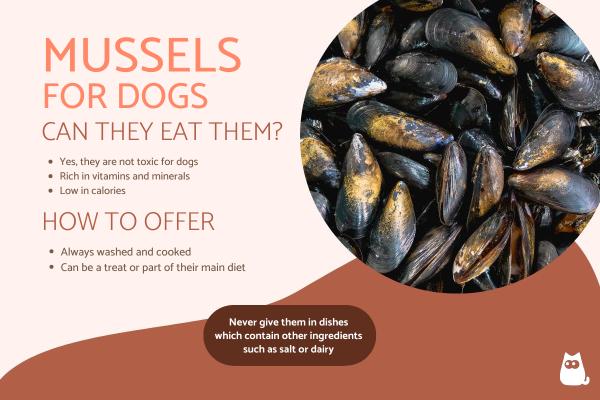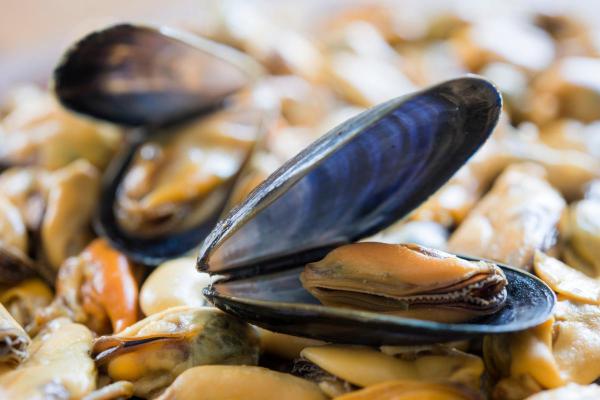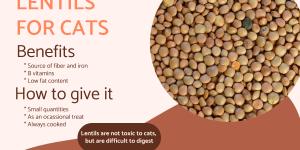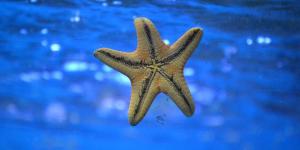Can Dogs Eat Mussels?



See files for Dogs
Dogs can eat mussels, but not in all circumstances. While seafood is not a common part of their wild diet, the nutritional needs of dogs means that mussels can provide the protein which makes up the largest part of their diet. Shrimp, crab, mussels and even lobster would be appetizing to dogs. In addition to the protein they need, there are also other compositional elements to seafood which are not of a benefit to dogs. In some cases, mussels for dogs might be a bad idea.
At AnimalWised, we explain more by asking can dogs eat mussels? We look at the circumstances in which this type of seafood can benefit a dog, as well as when it needs to be avoided.
Can dogs eat mussels safely?
The diet of dogs should be based on animal proteins. This means they need to eat meat from animals such as cows, chickens, turkeys and rabbits. Seafood such as salmon, hake, mackerel, herring and many different types of shellfish can also provide a lot of protein. For this reason, the meat of these types of seafood can be included in a dog's diet. In addition to protein, a dog can eat limited amounts of fruit, vegetables and cereals to maintain a balanced diet.
Mussels are a type of seafood known as bivalves. This is a reference to their shell which splits in two down the middle, each half being known as a valve. This keeps the mussel's soft tissues protected from potential predators. These shells are black and elongated, with some iridescence before cooking. The flesh of the mussel itself will be various shades of orange, sometimes very bright ad other times more muted.
Mussels are a common food in various cuisines around the world. There are various different recipes, often with a specific cooking liquor which imparts flavor while steaming. They can also be sold without the shell in cans or in various other preparations. It is the nature of these preparations which can help determine whether a dog can eat those mussels.
While we will explain the specifics of when a dog can eat mussels, we can make a general point. If we are to feed mussels to a dog, it is important they are prepared as naturally as possible. Many of the other ingredients in dishes which contain mussels will be prohibitive for dogs.
Benefits of mussels for dogs
Mussels are a source of high-quality animal protein, essential for the functioning of the canine organism. They also stand out for their mineral content, containing various levels of selenium, phosphorus, iron or iodine. They are also a source of B vitamins, such as vitamin B12. Both minerals and vitamins are micronutrients. They are substances the dog needs in small amounts, but which are essential for the development of all the functions of their body.
It is also worth mentioning the low fat content of mussels. They provide few calories, meaning they can be included in the diet of dogs that are overweight, obese or which gain weight easily.
You may have heard that these mollusks contain a large amount of omega 3 fatty acids or their anti-inflammatory and joint-protective effects. These properties are attributed only to a specific species of mussel, known as the New Zealand or green-lipped mussel. These are so-called due to the hue of their shell edges.
Are mussels toxic to dogs?
Generally speaking, mussels are not toxic to dogs. Many foods contain certain compounds which can be dangerous for the animal when consumed in large amounts. Like many other types of shellfish, mussels are known to contain varying levels of mercury[1].
Mercury is found in other seafood, such as tuna. The trace amounts in a portion of mussels shouldn't cause a dog any serious problems. However, if they were to eat a substantial amount, this would be toxic for the dog's organism. For this reason, it is important to give them the amounts recommended below.
Can dogs eat cooked mussels?
As we have said, it is best to offer mussels to dogs in the most natural way possible. Dogs can eat cooked mussels and it is best to avoid giving them prepared with other ingredients. Of you are wondering whether dogs can eat pickled mussels, you should know that it is not recommended. This preparation contains salt and other ingredients that should not be part of the regular diet of dogs.
This doesn't mean your dog will become sick if they eat a few pickled mussels. It shouldn't cause any gastrointestinal symptoms and it won't be toxic. However, if they were to eat a lot of pickled mussels over a long time, then it will become a problem.
In addition, do not feed dogs dishes such as moules marinière or curried mussels. These contain ingredients which can cause the dog harm. Spices can cause gastrointestinal upset and ingredients like heavy cream will add many calories, in addition to providing lactose which they cannot break down.
Learn what foods are toxic to dogs in our related article.

Can dogs eat raw mussels?
Raw shellfish is something humans eat regularly. When it is fresh and free of bacteria, it can be both very delicious and highly nutritious. The same applies to our dog. Giving them raw mussels means they won't have to worry about there being any additional ingredients which can cause harm to the dog.
However, raw seafood contains dangerous. Even if the fish or shellfish is OK in itself, it may be in a container which has bacteria. This problem is exacerbated if it has been left out for a long period. It is best to cook the mussels to ensure they are free from bacteria.
Whether you are cooking the mussels or feeding them to your dog raw, it is vital you wash them thoroughly. This will prevent bacteria from entering their organism.
Some seafood is also beneficial for dogs because they are food rich in taurine which dogs need.
How many mussels can dogs eat?
There is no single answer to this question. How many mussels you give your dog will depend on various factors. Firstly, it will depend on whether you are giving them as a treat or as part of their main meal. In the latter case, this is for people who want to feed their dog a homemade diet.
In truth, mussels are not the best option for this. They are relatively expensive and giving your dog too much shellfish can cause some of them gastrointestinal upset. Some dogs also will not find them as appetizing as other alternatives.
If giving the dog mussels as a treat, it is important to note that this should never be more than 10% of the dog's total food intake. For a small dog, giving them 1-2 mussels as a treat is sufficient. Larger dogs can eat more.
If we want to feed mussels to our dog as part of a homemade diet, we should contact a veterinarian. They will be able to assess the dog's individual needs and ensure they receive a balanced diet. They can determine how much will benefit your particular dog.
Contraindications of mussels for dogs
In this section we must differentiate two aspects, which are the state of health of the dog and their own characteristics. Some dogs suffer from certain pathologies such as diabetes or kidney failure which require a specific diet. In these cases, mussels may not be appropriate for them.
Before giving mussels to a dog in this situation, it is essential to consult a professional. This applies even if we only want to offer one as a reward. An example is dogs urinary stones. They should not eat foods rich in purines such as mussels or offal. We often see dogs with crystals in their urine when they have urinary stones.
The second aspect is related to allergies. Just as with humans, some dogs may be allergic to mussels or they just don't sit well in their stomach. If we want to prevent problems, it is best to offer the dog a very small amount of mussels and wait a day in case we see any gastrointestinal issues. If not, we can provide a larger amount as detailed above.
Side effects of mussels for dogs
If we offer mussels to our dog following the guidelines that we have explained, they are not expected to produce any side effects. The specimens that feel bad may show signs of digestive discomfort, such as abdominal pain, nausea, decomposition, diarrhea or vomiting. Dogs that are allergic to mussels may also experience this type of symptom, although food allergies often cause pruritus (itching).
If you want to read similar articles to Can Dogs Eat Mussels?, we recommend you visit our Healthy diets category.
1. Gutiérrez, A. J., Lozano, G., González, T., Ignacio Reguera, J., & Hardisson, A. (2006). Mercury content in tinned molluscs (mussel, cockle, variegated scallop, and razor shell) normally consumed in Spain, 2005. Journal of food protection, 69(9), 2237–2240.
https://doi.org/10.4315/0362-028x-69.9.2237
- Ministry of Agriculture, Fisheries and Food. "Mussel". Retrieved from: https://www.mapa.gob.es/es/ministerio/servicios/informacion/mejillon_tcm30-102425.pdf
- Stevenson and Rutgers. "Nutritional management of canine urolithiasis". Royal Canin.






